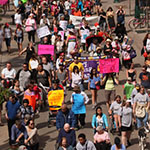By Louie Fermor
My understanding of myself as autistic was long-coming. It wasn’t until two years ago, during the first quarantine of 2020, that I first had the chance to stop and rest. Like so many others, the March 2020 mandatory quarantine was the first time I had access to a guaranteed basic income (via CERB) and the first time I ever had access to true rest.
While the experience of being alone for an entire month was hellish to many, it was idyllic for me. Alone and with the stability of CERB income, for the first time my only priority was to take care of myself.
It wasn’t an exotic vacation or thrilling adventure – just me in my quiet home with books, music, and tea. After a while, I realized that this kind of overwhelming relief wasn’t normal – finding such immediate but impactful fulfillment from something so simple as being alone and in my home put the massive discomfort, confusion, and frustration that had become my daily norm into perspective.

Oil paint on wood panel, 30 x 24 IN
It was a bittersweet reality check. I was the most self-confident, lighthearted, and untroubled I had been in years however, this happiness was proof that something was seriously wrong in my regular life.
Until then, the only representation I had seen of autistic people was from a medicalized (or pathologized) perspective: tv shows, movies, and books with autistic characters written and portrayed by people who weren’t autistic.
I didn’t see myself as someone less-than, pitiable, or monstrous like autistics are so often portrayed to be. And so, I had never recognized myself in any of them – of course I didn’t.
It wasn’t until quarantine and when I (like so many others at the time) was passing the time by scrolling through social media, that I first came across autistic-originated content. It was the first time I saw autistic people who reminded me of myself: chatty, animated, passionate, and making jokes.
The platform’s algorithms saw that I liked autistic creator content, and my feeds became flooded with people describing their experiences of special interests, alienation, joy, loneliness, and insatiable curiosity. It all snowballed from there.
Because I was in the unique circumstances of quarantine, wherein I had plenty of time on my hands, I could dedicate myself entirely to researching autism and self-diagnosing, and eventually, three months later, getting an adult late diagnosis.
Getting my diagnosis was an unquestionably pivotal point in my life that, in no small way, saved it. I am deeply proud of realizing this and empowering myself with the knowledge I need to create a happier, more fulfilling, and restful life.
Autism Society Alberta (autismalberta.ca)


